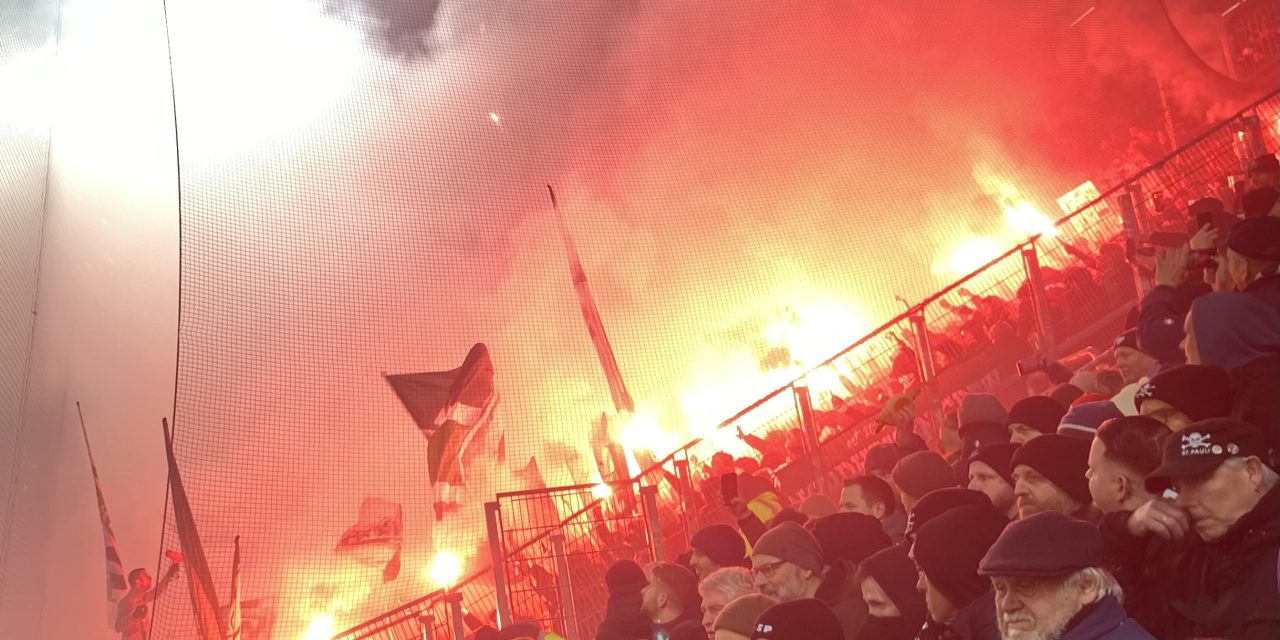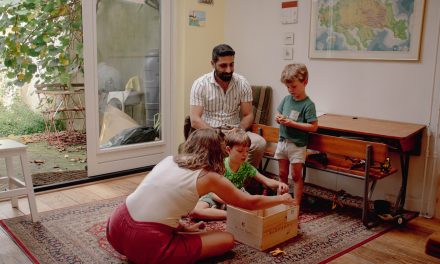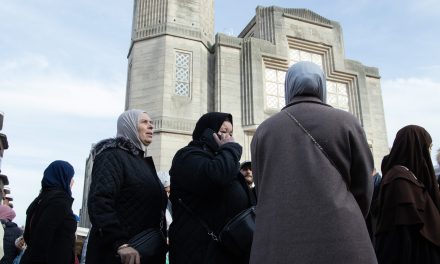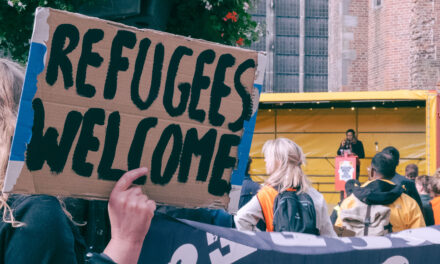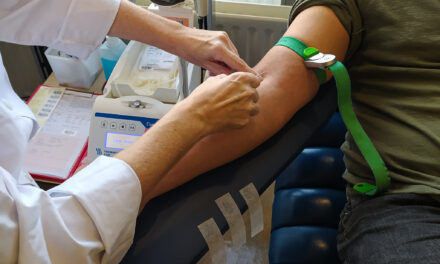Football and passion go hand in hand, and the football club FC St. Pauli is no exception. Known for its progressive values and active members, the German fan-favourite has earned a cult following. But even this beloved club from Hamburg faces challenges of political disagreements and questions about commercialization.
Frank opens the door and sits down at one of the benches of the “Kleine Pause” for yet another time. The diner has since 1986 delivered burgers and fries over the counters to the hungry customers in the district of St. Pauli.
Behind the counter is a woman in a black shirt with the yellow logo of the diner. The smell of frying oil and curry ketchup fills the air. This is really the place where you can take a small break from stressful everyday life.
With times changing in the neighbourhood of St Pauli in the last decades, the “Kleine Pause” is one of the few places, that has remained the same for its many regulars.
Since the days of the 80’s, a lot has changed in Germany, and with the upcoming elections for the country coming up in a months’ time, a lot is at stake.
Frank orders an iced tea, and speaks out:
“Everything gets more and more expensive. But here in one of the ‘Hamburger-originals’, the ‘Kleine Pause’ is a good island of old times.”
A district, a club, a feeling
The district of St. Pauli is located in the western part of Hamburg. Many people know the area because of the vibrant walkthrough of ‘the Reeperbahn’, the graffiti that can be seen wherever you look at the streets – and of course the football club of FC. St Pauli.
The club is not particularly famous for its achievements in football. Well, the club has never won any of the big German trophies, with fans only able to look jealously towards their neighbours from Hamburger SV, which has won the German league 6 times.
The trophy cabinet still has a lot of space open on the shelves for the future, but even though the taste of silverware is sweet, the supporters of the club are more focused on something entirely different – the values.
These values are so important, that the club has created guiding principles, that try to define what the club expects of their players, employees, and of course – fans.
Tolerance and respect for everyone that visits the stadium are among the main principles. And with a Germany polarized by politics in this period, the area of St. Pauli assembles people into groups of openness, as Frank Behrens, one of the club’s passionate fans, reflects.
“In a world of rising populism, homophobia, and xenophobia, St. Pauli remains a neighborhood where you know everyone here carries the same good moral standards,” he says.
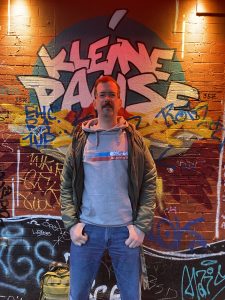
Photo by: Anders Mørck. Frank Behrens has been a fan of FC St. Pauli for decades.
Audio part 1:
In this audio piece, you will meet Frank Behrens, on the match day for a FC St. Pauli-game. Here there are specific traditions, that need to be followed before the first whistle of the game takes place.
Creating relationships
Sönke Goldbeck is a man with many facets. He is a man who is simply a fan of FC St. Pauli and has been for many years. Apart from that, he is also a part of the club’s supervisory board and the museum of the club.
In the museum, FC St. Pauli’s history is unfolded. But apart from the history inside the pitch, the museum also serves as a meeting place for fans, where friendships are formed.
This is showcased when you walk inside the entrance of the building. Normally, the atmosphere of a museum is often formal, with a register sitting in the front and a wardrobe at the back. Well, here there is a bar packed with fans drinking the German drink, glühwein, before the game. In the middle of the masses, you find Sönke Goldbeck in his working uniform – a tracksuit with the logo of FC St. Pauli on the left side of his chest.
“Many of the really good ideas people had after a beer in the middle of the night in the pub. And this place is like a bar. A museum can also be a meeting spot where people come together and create personal relationships,” he says.
Audio part 2:
Frank Behrens is now inside the stadium and the game is close to start. But for him, the fans’ warmup is nearly as important as the game itself.

Photo by: Anders Mørck
“We are not angels”
Since the late 1980s, the club has been associated with left-wing politics, embracing values quite different from those of other German clubs – and the fight against remains to this day.
“You can give many examples, where you can learn from history. For example, this whole thing about being against discrimination and the right wing is something that must be fought over and over again,” says Sönke Goldbeck.
Even though the fans are seen as being open to other cultures, sexualities, and religions, just to name a few, there are still problems inside the stadium, as Frank Behrens sees it.
“I would never say that we are all angels inside the stadium. There are times when people going inside the stadium and make white-men jokes,” Frank Behrens says.
Dani Freitag is working at the St. Pauli Tourist Office, where she is one of the guides at the office. In her work, she informs both locals and tourists about the vibrant life of St. Pauli.
“Everything that happens in this district has something to do with the football club and vice versa,” she says, explaining how the club’s principles are a part of the fan’s life to an extent far greater than just inside of the stadium.
“In the district of St. Pauli, there is a lot of people who move here, because they don’t feel welcome anywhere else,” Dani Freitag says.
Even though the district is well known for its openness and tolerance, there are also tendencies of rebellious traits.
“The biggest problem in our district is the alcohol consumption. That is where the violence comes from. That you could be afraid of. If you don’t like it, you should not come here,” she says.
This issue reflects the broader challenges in the district, where the vibrant nightlife can clash with the efforts to maintain safety and inclusivity in the district.
Audio part 3:
The game has now begun, but will Frank Behrens be satisfied with the result? And what matters most to him when he looks back on his time as a fan of the club?
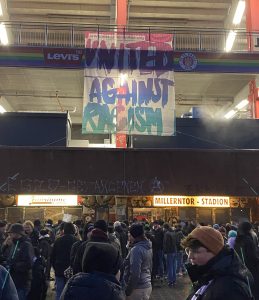
Photo by: Anders Mørck
Values are greater than results
One of the main values of FC St. Pauli is also the non-acceptance of the specific types of advertisement at the club. Sponsors need to have a reason for being present at the stadium, where some of the biggest companies are the local beer brand, Astra, and Levi’s, well-known for their jeans collection. FC St. Pauli has chosen to work together with Levi’s, as their “value of getting involved with the people that have a harder time than the most” and their rebellious side being some of the reasons for the cooperation between the two.
When you look across the stadium, you will even see several rainbow flags being waved by the fans at the stands, while the colours also appear on the armband on the arm of the football club’s captain, Australian midfielder Jackson Irvine.
The club has chosen to turn down any offers from companies sponsoring the naming rights of stadium, missing out on as much as 5 million euros annually. Other German clubs strike deals with major multibillion companies. Bayern Münich’s home field is called ‘Allianz Arena’ based on the insurance company, and Borussia Dortmund’s stadium is named after the company ‘Signal Iduna’.
FC St. Pauli is still one of a kind in the German football landscape. The club’s determination to stick to its values in a world of political polarization and rising commercial influences is a unique but difficult strategy to withhold. But Frank Behrens resists – even with the consequences of doing so:
“Many clubs have no political morals, while we have fought for our values. But I don’t regret it if we are relegated to the second division, simply because our budget is limited,” he says.
